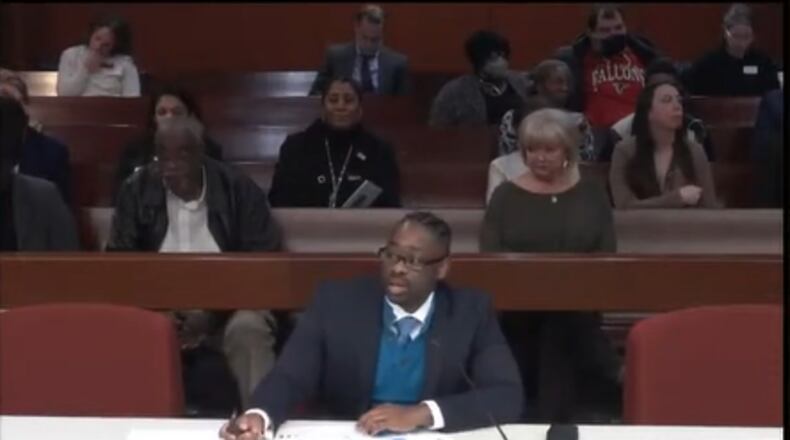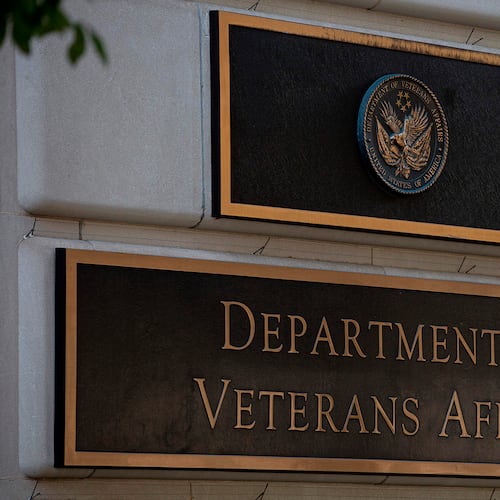A state official who oversees the state’s disability workforce program says he’s seen gains for vulnerable people seeking help from the Georgia Vocational Rehabilitation Agency.
The GVRA executive director’s assessment comes months after an investigation by The Atlanta Journal-Constitution documented longstanding systemic problems within his agency.
“Because we are more efficient and we are more effective we are able to provide additional services,” Executive Director Chris Wells said after speaking at a state House subcommittee on Thursday.
The AJC investigation published in July found the agency was failing to fulfill its core mission of helping those with disabilities find work that is meaningful with the right accommodations to succeed in a job.
Former clients and counselors, along with an advocacy group’s civil rights complaint, echoed similar complaints about the agency. Federal officials also found GVRA did not “prioritize the employment rate” among its participants, according to a report issued last March.
The agency reported its clients’ employment rate was 25% for fiscal year 2023, which was among the nation’s worst. But for the fiscal year that ended on June 30, 2024, the agency reported that a total of 78% of its clients had work when they exited the program.
However, those figures tell just part of the story: while the number of people who left the program with jobs has increased in recent years, it’s still lower than prepandemic levels, according to agency data.
In a brief interview after Thursday’s hearing, Wells said the agency changed its policy to keep cases open for a longer period so that counselors can make contact with them. That increases the odds that a client will resume services, which includes helping a person keep a job they already have, according to the agency. Wells said this change has meant that not as many people are exiting the program.
State Sen. Sally Harrell, a Democrat, said she’s “cautiously optimistic” to see the GVRA’s numbers improving.
“I don’t want to just look at numbers: I like to look at people’s experiences and the quality of services,” Harrell said. “This is a very vulnerable population.”
GVRA’s new employment rate is higher than most other states, said Amy Scherer, a senior staff attorney for the National Disability Rights Network. She also said it’s unsurprising that the number of people who leave the program with jobs is still lower than prepandemic levels, as that reflects the trends she is seeing nationally.
“It is a significant improvement from what they were doing before,” she said of GVRA’s figures.
Not all are satisfied. Dozens of blind and deaf-blind Georgians gathered at the Statehouse on Thursday to lobby their elected officials on their vocational rehabilitation services.
The group, known as the Georgia Vision Alliance, say the services provided to their community have been lacking for years. The alliance is pushing for legislation to move blind services out of GVRA, and into the hands of a separate state commission.
“We don’t know what the problem is. It seems that, number one, they don’t know what to do with us,” Cecily Laney Nipper, president of the Georgia Council of the Blind, said of GVRA.
Wells, the executive director, said a federal change has interfered with the agency’s ability to offer prevocational rehabilitation services that many people who are blind have relied upon.
“That is one we will continue to work with our federal partners to see how we can make that adjustment,” he said.
More broadly, GVRA has reported making a number of changes to improve how it delivers services.
As of mid-January, the agency said it had hired more counselors: about 145 in total and approximately 100 cases per counselor on average — numbers that Scherer, the attorney for the National Disability Rights Network, said are better than other states. Scherer said that states are now averaging as many as 200 cases per counselor.
In a written statement, the agency said it’s made other improvements: It paid out more than $2.7 million to hundreds of students through a higher education grant. The agency also reported an increased number of referrals, applications and eligibility determinations since the pandemic, and it’s been providing more services to students.
The agency also reported that it revamped two vocational campuses so they can offer training in fields like heavy machinery, and allow for students to go through these programs more quickly.
The federal government previously reported that Georgians who found work through GVRA were often funneled into lower-skilled jobs, such as fast-food workers, janitors or cashiers. The most recent annual figures provided by GVRA show: 225 people had skilled jobs, 708 semiskilled jobs and 516 unskilled jobs.
Julie Kegley, a program director for the Georgia Advocacy Office, an organization that assists people with disabilities, said the recent progress is not enough.
“While the numbers are an improvement over the preceding year, it remains clear that GVRA fails in its mandate to facilitate connecting people with disabilities to meaningful employment,” said Kegley.
In the months since the AJC published its story on the agency, Georgians reached out to share stories of their lingering problems with the agency. Koleman Taylor, 23, first contacted the AJC last summer because he could no longer hear properly through the hearing aids that GVRA helped him acquire.
For Taylor, who works at a retail bakery in Rabun County, the long wait to receive new hearing aids have made his job more difficult. He said his limited hearing interferes with his ability to communicate with co-workers and frustrates customers who are shopping for baked goods.
“I sound muffled, my words slur together,” Taylor said in a January interview.
At the time, Taylor said it had been two months since he had spoken with his counselor. He filled out a form to get his hearing evaluated and received no response back.
After the AJC contacted GVRA last month about Taylor’s struggles, a state supervisor reached out to him to schedule an appointment.
As of Thursday, Taylor said he’s still waiting for his hearing aids to come through.
About the Author
Keep Reading
The Latest
Featured


